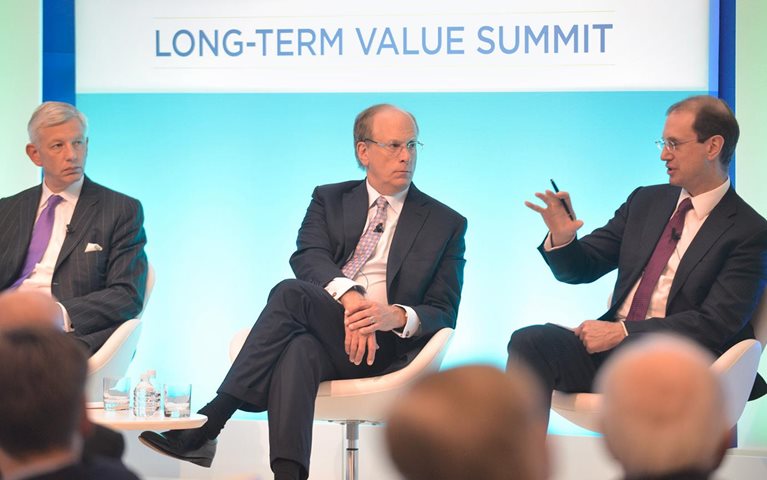The view was stunning: a sunlit vista across Manhattan’s Central Park. But participants at last week’s Focusing Capital on the Long Term (FCLT) Summit were concerned with horizons measured in decades, not miles.
One hundred and fifty CEOs, chief investment officers, policy makers, and experts converged on New York to discuss ways to nurture long-term thinking and investing in a business–financial system seemingly obsessed with the near term.
The first order of the day? A pop quiz by Nitin Nohria, dean of the Harvard Business School, and Harvard professor George Serafeim. The questions came quickly. What is the percentage of US equities in index funds? What is the average duration of CEO compensation? What’s the average turnover of S&P companies over 50 years? The answers, scored electronically, revealed gaps in the group’s perceptions—and the reality—of long-term investment behavior.
The message? When we live in a world where facts can have a ‘‘suspect level of accuracy,” it’s critical to seek out the truth—and accurate research. This is where FCLTGlobal, the independent nonprofit that sponsored the Summit, comes in.
Long-termism is one of McKinsey’s enduring values, underpinning our work on organizational health and social responsibility. In 2011, our managing director, Dominic Barton, started laying the groundwork for this initiative, leading research and publishing reports in both Harvard Business Review and McKinsey’s own publications.

To carry on this work, in 2016 McKinsey helped establish FCLTGlobal, led by McKinsey alum Sarah Williamson, who came to the organization with over 25 years of investment-banking and asset-management experience. In the past 18 months, membership has doubled, from 18 to 42 global asset owners, managers, and corporations. The organization has published research that has been discussed in the international investment community, as well as the UK Parliament, the US Congress, and the media.
“The next step is taking ownership of the issue and creating practical antidotes to short-termism. Short-term pressures come from many points along the investment value chain, and lasting change can be driven effectively by asset owners, asset managers, and corporations,” Sarah said. “There are significant costs to society when overwhelming pressure for near-term results drowns out long-term aspirations. We’re trying to reverse that.”
Two of the morning sessions pressure-tested FCLT’s thinking on investment mandates and moving beyond short-term guidance. “We wanted to bring representatives of companies, asset managers, and asset owners to the same table—which does not happen often—and give them an opportunity to talk candidly with their peers,” explained Mark Wiseman, FCLTGlobal’s board chair.

In a CEO panel moderated by Dominic Barton, the chief executives of BlackRock, Dow, Unilever, and CDPQ—Larry Fink, Andrew Liveris, Paul Polman, and Michael Sabia, respectively—talked about the challenges of maintaining the long-term focus and integrity of organizations while facing the intense, disruptive pressures of short-term activists.
Tim Koller, a McKinsey partner and coauthor of Valuation: Measuring and Managing the Value of Companies, the industry standard on determining the value of business organizations, attended the Summit. He sees progress. “It’s gone beyond just talk about long-termism—especially with very large investors, such as BlackRock, investing in substantial staff and resources to evaluate and make voting decisions about companies, including companies in their index funds, which have a long-investment horizon,” he said. “Index funds, in total, represent about 20 percent of the market today and are growing.”
One priority for guidance is the long-term board. “There is much research to do in this area: what the makeup of the board should be, priorities, time spent, compensation,” says Mark. “We started early work by visiting some family businesses that have lasted several generations. In one of them, people talked about the ‘Zoe factor’—Zoe was a grandchild—and what the company would look like in her era. We want to ensure we capture that type of mind-set and content.”
CEO evaluation is also important, according to Tim. A board should understand, in depth, a CEO’s strategic decisions, whether they have built a good management team, and what kind of culture they are encouraging. “They should be evaluated on decisions they make—not just in the short term but also on those that will be affecting the company long after they’ve gone,” says Tim.
“We have more to do,” notes Mark. “We raised the alarm, delivered the message, and now it’s time to develop practical solutions.” The next FCLT Summit is set for 2020—for those with a long-term mindset, it’ll be here in the blink of an eye.
